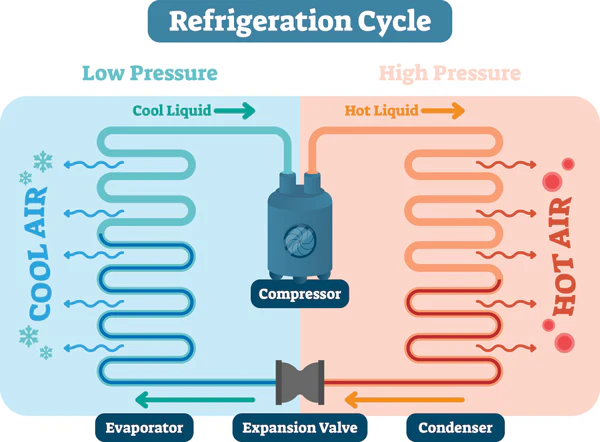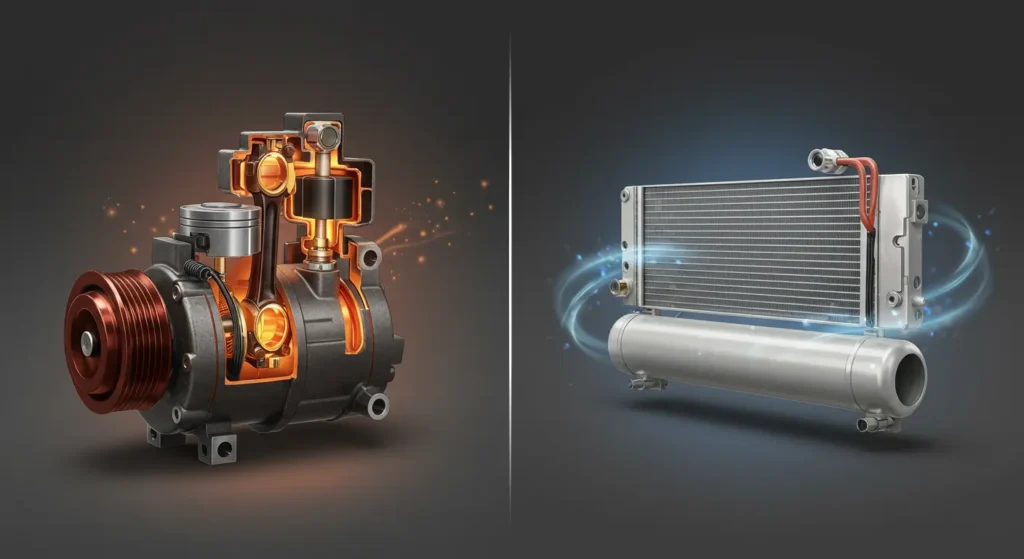If you’re anything like most homeowners, you don’t spend much time thinking about how your air conditioning works, you just want it to keep you cool and comfortable.
That’s where we come in.
At Alpha HVAC NJ, we make it our business to understand the inner workings of your air conditioning system, so you don’t have to. But having a general idea of key components like the AC condenser and compressor, can help you understand your system better, prepare for potential issues, and make informed decisions when it comes to repairs or replacements.
Here’s a quick and simple breakdown of how your AC system works and what separates the condenser from the compressor.

How Do AC Units Work?
Contrary to popular belief, your air conditioner doesn’t just “pump cool air” into your home. Instead, it removes heat from the indo
or air and circulates the cooled air back inside. The real hero behind this magic? A refrigerant like Freon.
Your AC system is made up of three key components:
-
Evaporator
-
Compressor
-
Condenser
Let’s walk through each step in the cooling cycle.
1) What Is an Evaporator?
Your air conditioning process starts when your thermostat detects indoor temperatures higher than your preferred setting. This triggers the AC unit to kick on.
Warm air from inside your home is pulled through return vents and sent to the evaporator coil. The coil is filled with refrigerant that absorbs heat from the air, effectively cooling it. This cooled air is pushed back into your living space, while the now heat-filled refrigerant leaves the evaporator as low-pressure gas.
2) What Is an AC Compressor?
Next, the refrigerant flows to the compressor, which is considered the “heart” of your AC system. It’s located in the outdoor unit and connects the evaporator to the condenser.
The compressor’s job is to compress the low-pressure refrigerant gas, packing the molecules tightly to raise both the temperature and pressure. This step is crucial because the refrigerant must reach a high temperature and pressure to efficiently release the absorbed heat in the next phase.
3) What Is an AC Condenser?
After compression, the refrigerant – now a hot, high-pressure gas, enters the condenser unit located outside your home.
The condenser coil helps release the heat from the refrigerant into the outside air. A fan blows across the coil to speed up this cooling process, turning the hot gas into a high-pressure liquid.
This liquid refrigerant then moves through the expansion valve, where it’s depressurized and cooled further, preparing it to cycle back through the evaporator.
4) Back to the Evaporator
This liquid moves back to the evaporator, ready to continue the cycle until your home reaches the desired temperature.
These four steps are repeated again and again, as long as your AC system is active.
Read More: Should I Use an HVAC Service Contractor for Air Conditioning?
What Is an Air Conditioning Compressor?
The AC compressor is one of the most important parts of your air conditioning system. Often called the “heart” of the AC, it moves the refrigerant through the system so your home stays cool. You’ll find the air conditioner compressor inside the outdoor unit, which is also known as the condenser unit.
How an Air Conditioner Compressor Works
The compressor gets the refrigerant after it picks up heat from inside your home. At this point, the refrigerant is a warm, low-pressure gas. Before it can cool your home again, it needs to be turned back into a cold liquid. The compressor does the first part of this job it squeezes the refrigerant and adds energy, turning it into a hot, high-pressure gas.
This step does two important things:
-
It makes the refrigerant hotter than the air outside so it can easily release heat.
-
It helps the refrigerant flow smoothly through the rest of the AC system.
After the compressor finishes, the refrigerant moves to the condenser, where the heat gets released.
Types of AC Compressors
There are different types of air conditioner compressors, and each works in a slightly different way. Here are the most common types used in residential and commercial AC systems:
-
Reciprocating AC Compressor
This is the most common type. It uses a piston to compress the refrigerant, much like a car engine. It’s reliable and cost-effective. -
Scroll AC Compressor
Scroll compressors use two spiral-shaped parts to compress the refrigerant. They are quiet, energy-efficient, and commonly found in modern AC units. -
Rotary AC Compressor
These are compact and quiet. A rotary AC compressor works by spinning refrigerant through rotating blades, making it great for smaller spaces. -
Screw AC Compressor
Mostly used in large commercial systems, this type uses two rotating screws to move and compress refrigerant. It’s very efficient for heavy-duty cooling. -
Centrifugal AC Compressor
These are used in big buildings. A centrifugal air conditioner compressor uses a spinning fan to move refrigerant. It’s powerful but mostly found in industrial HVAC systems.
What Is a Condenser in an Air Conditioner?
How a Condenser Works
Types of AC Condensers
Understanding the different types of air conditioner condensers can help you choose the right one for your home or business. Here are the main types:
- Air-Cooled Condenser
Most common in residential AC systems. Uses air blown by a fan to cool the refrigerant. Easy to install and maintain. - Water-Cooled Condenser
Uses water to cool the refrigerant. Often found in large buildings or commercial HVAC systems. Requires a steady water supply and is very efficient. - Evaporative Condenser
Combines air and water cooling. Great for hot, dry climates and used in industrial settings.
Each type of AC condenser has its own benefits. Regular AC maintenance can keep your system running smoothly, no matter which type you have.
AC Compressor vs. Condenser Comparison Table
| Compressor |
Condenser |
|
|
Function |
Reduces the volume of gas to add pressure |
Takes in the pressurized gas turning it into a liquid-vapor |
|
Types |
Reciprocating, Rotary, Centrifugal, Screw and Scroll |
Air-cooled, Water-cooled &Evaporative |
|
Components |
Electric motor, pump, and receiver |
Main unit, coil, and fan |
|
Order of Function |
Works before the condenser |
Works after the compressor |
|
Location of Placement |
Inside the main unit of the air conditioner |
Outside the home/structure |
Read More: What Heating and Cooling System is Best?
What’s the Difference Between an AC Condenser and Compressor?
The compressor and condenser are both found in your outdoor AC unit, but they have distinct roles:
Compressor:
-
Part of the condenser unit
-
Increases the pressure and temperature of the refrigerant gas
-
Pushes the refrigerant through the rest of the system
Condenser Coil:
-
Transforms hot refrigerant gas into a cooler liquid
-
Works with a fan to release heat outdoors
The condenser unit houses the compressor, condenser coil, fan, and cabinet. Each part works together to keep your home cool, but they play different roles in the process.
What Do I Do if My Compressor or Condenser Stops Working?
Regular AC maintenance and scheduled air conditioner inspections are essential to keep your system working properly. If your AC compressor doesn’t turn on, your air conditioner blows warm air, or it stops working completely, it’s time to call a professional. A certified HVAC technician can inspect the unit, find the problem, and carry out any needed AC repairs. Replacing a compressor or handling refrigerant should always be done by an experienced expert.
AC FREQUENTLY ASKED QUESTIONS
How Do I Know If My Compressor or Condenser Is Bad?
The symptoms of a bad AC compressor or condenser have a lot of overlap, so there’s a good chance you’ll need to reach out to HVAC professionals for a clear diagnosis. For example, There are overlapping symptoms when either your compressor or condenser fails, such as:
-
Strange or loud noises from the outdoor unit
-
AC no longer cooling efficiently
-
Visible leaks or pooling near the unit
Compressor-specific issues may also include:
-
Vibrations or shaking of the outdoor unit
-
Tripped circuit breakers
-
AC system not turning on at all
Can a Bad Condenser Damage a Compressor?
Yes. If the condenser is clogged, dirty, or malfunctioning, it may cause the compressor to overheat, eventually damaging it. This is why regular maintenance is critical, cleaning your condenser can prevent bigger, more expensive issues down the line.
How Much Does It Cost to Replace a Condenser or Compressor?
The total cost of either component varies depending on the specifications you need for your home and the labor prices, which fluctuate depending on your location. You’ll need to schedule an appointment and get a quote.
However, The cost of replacing either component varies depending on:
-
Unit size
-
Labor rates in your area
-
Whether your system is still under warranty
Here’s a general idea:
-
AC Condenser Coil Replacement: The coil itself can cost several thousand dollars to replace.
-
AC Compressor Replacement: Compressor costs are generally less than a coil, but can still cost several thousand dollars.
In some cases, replacing the entire AC unit may be more cost-effective than replacing individual parts, especially if your system is older or inefficient. A professional from Alpha HVAC NJ can help assess your system and recommend the most budget-friendly and effective solution.
Choose Alpha HVAC Contractors for Your Air Conditioner Needs
Your AC system is a complex machine, but you don’t have to figure it out on your own. At Alpha HVAC NJ, our certified HVAC technicians are here to ensure your system runs smoothly all summer long.
Whether you need repairs, seasonal maintenance, or a full system replacement, we’ve got you covered.
Our Services Include:
✅ Air Conditioning
✅ Full AC Installations
✅ Air Conditioner Repair
✅ AC Unit Replacement
✅ Heating Services
✅ HVAC Services
✅ Indoor Air Quality Solutions
📞 Call us today at (551) 357-0049 or schedule your appointment online with our AC Specialist. We proudly serve Hoboken and surrounding areas across New Jersey.
